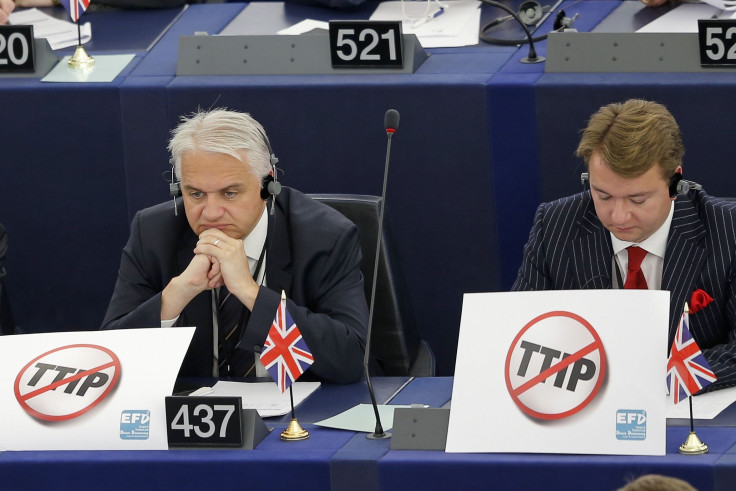Doubts Over EU's Proposals For Saving US Trade Deal

LONDON (Reuters) - The European Union has more work to do, experts say, if it hopes to seal a transatlantic trade deal that has been criticized for leaving governments open to international legal action from companies affected by changes to tax and regulation.
The European Commission, the EU's executive arm, is right now negotiating a trade and investment treaty with the United States - the Transatlantic Trade and Investment Partnership (TTIP) - that it says could add 119 billion euros annually to Europe’s economy and 95 billion euros to the U.S. economy.
However the treaty faces growing opposition in Europe from politicians, labor unions and campaign groups who fear it may prevent governments from being able to ban unsafe products or tax businesses because of a provision protecting investors’ rights.
The provision referring to "fair and equitable treatment", was introduced to treaties decades ago to allow investors to seek redress if their assets were expropriated by governments.
It allows businesses to sue via international courts that do not defer to national interests and has increasingly been used to sanction governments over everything from banning chemicals, withdrawing tax breaks or writing new environmental regulations.
Matthias Fekl, French minister for trade, is especially critical of the EU's plan to include this right to sue in tribunals in the TTIP.
He said in a recent interview that France would "never allow private tribunals in the pay of multinational companies to dictate the policies of sovereign states."
But businesses and their lobby groups have told the European Commission they object to any scaling back in their ability to sue governments or any requirement they do so in national courts.
In response, the EC has redrafted parts of the trade treaty to limit the circumstances under which a claim can be made.
It has also proposed a new appeals process for governments and suggested new rules for selecting arbitrators – currently mainly corporate lawyers who campaigners say are biased towards corporations.
It's not a watertight solution, some say.
"There are definitely some improvements but it’s not a dramatic reform," said Lise Johnson, Head of Investment Law and Policy at Columbia University’s Center on Sustainable Investment.
"I don’t think there is enough clarity on fair and equitable treatment to reduce the scope for arbitrators to interpret it creatively," she added.
Matthew Weiniger, a partner at law firm Herbert Smith Freehills in London said he expected any tightening of the key clauses to be outweighed by the expansion of the number of European countries which will now be subject to lawsuits.
"There’s no question about it. There will be claims," he said, noting Eastern European countries in particular face claims over regulations which change the business environment unexpectedly.
RED HERRING?
Jakob Ragnwaldh, partner at law firm Mannheimer Swartling in Stockholm, said the fact governments have been successfully sued in tribunals only a few times shows the risks of lawsuits is being exaggerated by people who would oppose any treaty.
"It’s a red herring that has been placed there on purpose by individuals and organizations who do not believe in free trade," he said.
But the number of cases being filed is increasing and the threat of action can deter governments from introducing regulations they think may benefit their citizens
In 1998 Canada abandoned a planned ban on a fuel additive after its manufacturer launched a case. In 2013 New Zealand paused plans to introduce plain packaging for tobacco pending the outcome of lawsuits against Australia over the same issue.
The fact that many of these cases have set investor-friendly precedents could make governments more likely to lose future ones, warned Gus Van Harten, Associate Professor at Osgoode Hall Law School in Toronto.
A particular problem, he said, was the tendency of international tribunals to rule that governments should respect companies’ "legitimate expectations" that regulations or tax breaks will remain stable.
National courts usually see that entitlement as subservient to the decisions of their parliament, something international courts do not.
The U.S. excludes any respect for legitimate expectations in its treaties.
The EU hopes to counter the increase in investor-friendly tribunal rulings by establishing a new code of conduct for arbitrators and a roster of lawyers and judges from whom arbitrators could be selected.
But NGOs question whether that would really change the profile of arbitrators, and lawyers say any restriction in the number of trade lawyers being appointed could mean there were not enough qualified people available to sit on panels.
Some European politicians and NGOs have said it would be best to leave this kind of investor redress out of the treaty all together. The United States and European Union, along with business groups, oppose this on the grounds that protecting investors encourages businesses to invest overseas.
However NGOs and academics say there is little evidence that including this protective clause has so far swayed companies to make investments they would otherwise not: Bergan noted that Brazil, one of the world's largest recipients of inward investment, has refused to sign up for such clauses.
An EU spokesman was unable to identify any investment which a company had approved or abandoned because of the existence or absence of an investor clause.
(Reporting by Tom Bergin; Editing by Sophie Walker)
© Copyright Thomson Reuters 2024. All rights reserved.





















